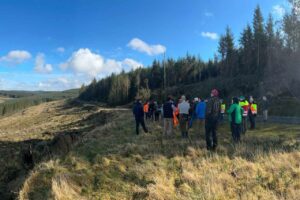A worrying report by the EFRA Committee on the tree planting agenda in England recognises the skills crisis as a key barrier to success, quoting evidence put forward by the Institute.
Shireen Chambers MBE FICFor was invited to give evidence at the inquiry in 2021, raising multiple challenges in skills and training for the sector which put government’s ambitions on the climate crisis at risk. The Institute’s position paper in October further outlined these issues.
The report also highlights opportunities to expand domestic tree production and increase the amount of timber used in building and construction.
We welcome the report and the Committee’s recognition of the challenges and we plan to continue our work with Defra and across government on resolving the issues.
Lack of focus risks felling Government tree planting plans, warn MPs
The Government has been told that it won’t achieve its goals on tree planting – key to achieving the UK’s net zero, biodiversity and nature recovery objectives – unless it puts a comprehensive plan in place to support greater planting.
The Environment, Food and Rural Affairs Committee is also calling on ministers to seize the opportunity to expand domestic tree production, the forestry sector workforce and to increase the amount of domestic timber used in UK building and construction.
In a new report, Tree Planting, the Committee recommends more comprehensive annual planting targets, better finance schemes and more accurate mapping if the government is to achieve its aim of creating 30,000 hectares of new woodland every year in the UK by 2025.
Setting annual targets for England’s contribution to the target would provide certainty to the sector, says the report. Current performance indicates a rapid increase in planting rates would be required to reach the UK target but the government has not set a clear goal for England’s contribution, which will probably require trebling its planting rate by 2024. This would require a ‘steep climb’, say MPs.
Planting ‘the right tree in the right place’ will be critical to the Government’s net zero, nature recovery and biodiversity goals. Today’s report calls on Defra, the Forest Commission and Natural England to set out a plan for completing the detailed mapping work required to ensure trees are planted in beneficial locations. Government must help local authorities to manage competing priorities for land use by producing more comprehensive guidance on creating Local Nature Recovery Strategies.
Planting trees must be economically viable. The report calls on Defra to publish and invite comments on the modelling which underpins new incentive regimes, to offer financial certainty to kickstart planting. The Committee believes Government has missed an opportunity to change the model for woodland management and recommends a review of the length of the maintenance payment to bridge a potential ten year gap between the end of subsidies and start of income generation from tree planting.
A key barrier to England’s tree planting ambitions will be the lack of a sufficiently skilled workforce. The Committee calls on Defra to establish a dedicated taskforce including the Department for Education, the Forestry Commission and training providers to deliver a clear plan to recruit at least 300 new recruits into woodland creation roles. The Committee expects this taskforce to report back by October 2022.
The Chair of the Environment, Food and Rural Affairs Committee, Neil Parish MP, said:
“Government really must get its act together. As it stands, this plan does not even have annual targets for the number of hectares of new woodland to be planted in England. Meanwhile, the Committee heard that the UK imported more than 80 per cent of the wood it used in 2020. We should aim to meet all the UK’s planting needs from domestically grown trees.
“We welcome the government’s ambition for woodland creation, but crucial details are still missing – including the types of trees to plant, the land they will be planted on and the finance for these projects.
“Expecting landowners to forge ahead without more support is simply not realistic. Government must demonstrate its working to demonstrate how tree planting is economically viable. If we want tree planting to pay for itself, clear incentives for action are required – both in Government subsidies for planting, and from timber sales.
“Farmers and growers need certainty to plan ahead. There is a troubling lack of clarity about Government plans – how, what and who will deliver England’s tree planting ambitions. The UK’s commitment net zero, biodiversity and nature recovery are essential to the health of our plant and future generations, we must make sure they are delivered.”






